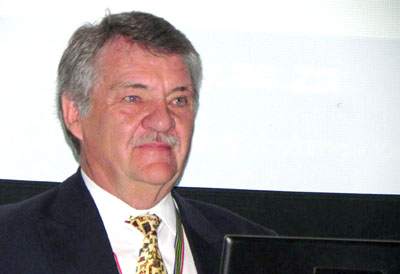Latest News Archive
Please select Category, Year, and then Month to display items
31 December 2019
|
Story Dr Cindé Greyling
|
Photo Anja Aucamp
 Dr Mariana Erasmus, SAENSE Platform Manager, says water remediation is vital for both the ecosystem and industries.
Dr Mariana Erasmus, SAENSE Platform Manager, says water remediation is vital for both the ecosystem and industries.
KovsieInnovation at the UFS supports innovative research outputs in various ways – one of which is to protect the intellectual property and to register patents where viable. This is in line with KovsieInnovation’s broader aim to create third-stream income for the university. Patent registration is a complex process and the UFS is proud to have the needed expertise to properly facilitate such an endeavour.
The SAENSE Platform
South Africa is a water-scarce country, with many water hungry industries (such as agriculture and mining). “Industrial processes often contaminate water with heavy metals, harmful chemicals, radioactive waste, and even organic sludge,” Dr Mariana Erasmus, SAENSE Platform Manager, explains.
Hence, water remediation is vital for both the ecosystem and industries. One of the key functions of the SAENSE Platform is to offer water-remedial solutions for the (bio)remediation of nitrates, heavy metals, and salts, among others. The platform’s activities and services are supported by undergraduate and postgraduate students and researchers, using Technology Innovation Agency (TIA) funding. TIA is a national public entity that serves as key institutional intervention to bridge the innovation chasm between research and development.
From waste to water
Through the joint effort of two mining companies and the UFS/TIA SAENSE Research Platform, a new treatment for mine drainage (MD) has been developed. This patented B-DAS (Barium – Dispersed Alkaline Substrate) technology effectively treats the major contaminants found in acid, alkaline, or neutral mining wastewater. The aim of the B-DAS system is to provide a passive water-treatment solution with minimum waste production; it can also be a potential pre-treatment for reverse osmosis (RO) to lower the requirements of the membranes and therefore potentially reduce the RO cost.
The success of the patent is that it turns unusable water into water that is fit for agricultural purposes at a reduced cost and increased efficiency.
Prof. Johan Grobbelaar part of history
2010-09-23
 |
|
Prof. Johan Grobbelaar from the Department of Plant Sciences at the recent 31st Congress of the International Limnological Society (SIL), which was held in Cape Town.
Photo: Supplied
|
The 31st Congress of the International Limnological Society (SIL) was recently held at the Cape Town International Convention Centre (CTICC).
Prof. Johan Grobbelaar from the Department of Plant Sciences at the University of the Free State (UFS), who is also the chairperson of the local organising committee (LOC), worked hard for six years to secure the bid to host the congress in South Africa. The LOC consisted of Prof. Grobbelaar, Prof. Brian Allanson, Prof. Jenny Day, Dr Carin van Ginkel and Dr Mike Silberbauer.
SIL was founded in 1922 to further the study and understanding of all aspects of limnology, the science of inland aquatic ecosystems and their management.
Congresses are held every three years and this was the first time that SIL met on the African continent.
Almost 400 delegates from 42 countries attended this congress where the state of the science of limnology was presented with two keynote speakers, six plenary lectures, 230 oral and 76 poster presentations, mostly running in five parallel sessions. Exhibitions displayed some of South Africa’s role players as well as the latest equipment from abroad. Delegates could also join pre- and post-congress excursions and the new SIL journal, Inland Waters, was launched at the congress.
Many of the presentations dealt with water as a limited resource, pollution problems and the impact of climate change. The congress resolved that SIL would play a more prominent role in creating awareness of problems impacting on inland waters and also afforded solutions. The 32nd SIL congress will be held in Budapest, Hungary in 2013.